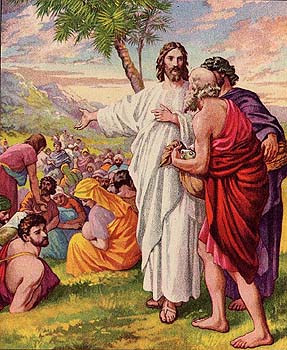
Throughout the historical path of humanity, God has revealed himself ever more clearly and insistently by his actions in history. The most definitive and complete revelation of who he his and so, who we are, is in his Son, Jesus Christ, through whom everything was made.
So God is not simply an observer of history, watching what happens among the people he has made. As the source of all things he continues to be its source, day by day and hour by hour sustaining, creating, loving the universe.
The mystery of God’s creative love shines forth in the sacraments of the church, rituals given by God using created things to make present the realities of God’s saving love in our daily lives. In them, the Church sees the working of the Holy Spirit to bring all people into the saving love of the divine life.
2 comments:
Hello,
This post reminds me of a question about the role played here and now by each of the three members of the economical Trinity. If one considers that the Father is currently acting in developing the creation (the so-called "continuous creation" theology), and if the Holy Spirit is present in every activity of this world which enhances life & love, what is the part played by the Son today ?
I can't imagine him not doing anything any more, because he redeemed us by dying and resurrecting 2000 years ago and that's it, but I nevertheless fail to understand what he is doing...
Thank you for your answer.
Thank you for your interesting question.
I think the problem arises from thinking about the Trinity too singly. ‘The Lord our God, the Lord is One’ as Moses and Jesus remind us. The only difference between the persons of the Trinity is a difference of relationship: the Father is not the Son etc. When we speak of God doing anything, creating and sustaining the world for example or enhancing life and love, it is the One Triune God that is involved, albeit as a mystery that created understanding is unable to grasp. It is simply the limits of created knowledge and language that appropriates actions and workings under the description of one or other Divine person.
Even so, St Thomas Aquinas in his discussion of the effect of Our Lord’s Ascension (Summa IIIa q. 57 art. 6) suggests, ‘because the very showing of Himself in the human nature which He took with Him to heaven is a pleading for us, so that for the very reason that God so exalted human nature in Christ, He may take pity on them for whom the Son of God took human nature.’ So, the Son intercedes as the High Priest, a further thought that is found in the Letter to the Hebrews 7.25.
Post a Comment